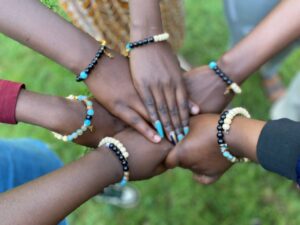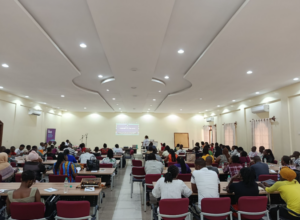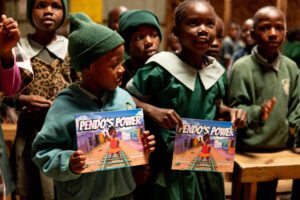Fifteen years ago, I made a career shift that completely changed me.
Having worked with numerous nonprofits in Kenya and Zambia as a filmmaker, I was going in and out of homes, in and out of villages, and in and out of communities, listening to heart wrenching stories from survivors of sexual violence.
I met Lydia when she was just 18. Though she graduated from high school two years before, she didn’t have any support to go to university. Her dream was to prevent sexual abuse from happening in her community of Kibera, East Africa’s largest slum. Though her community was rampant with abuse, poverty, and lack of opportunities, Lydia knew that education would open up new doors not only for herself, but for other girls in Kibera.
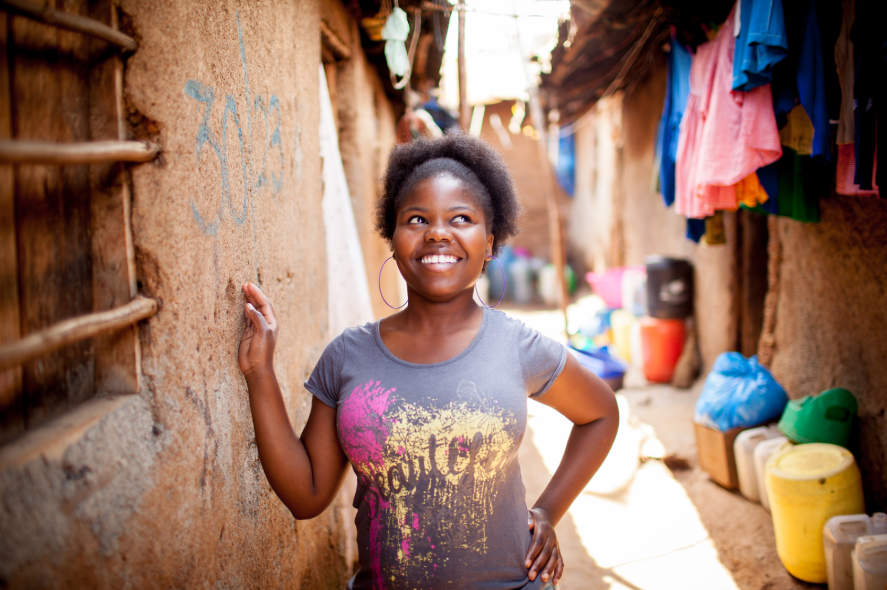
Image: Lydia, at 18, as a new university student pursuing a Bachelor’s Degree in Gender & Development Studies in Kenya.
“Education equips survivors with the knowledge, confidence, and voice to challenge the systems that oppressed us. It opens up our minds to all the possibilities beyond the limitations of our environments and pain. It helps us create change not just for ourselves but also for others who have been silenced.”
Lydia Matioli, Freely in Hope Alumni
I was enamored by lydia's vision to prevent abuse from happening to other girls in her community.
I thought that perhaps, with a nonprofit model, I could find a way to fully fund Lydia’s dreams of graduating from university.
Instead of simply capturing their stories as a filmmaker, I started to imagine what it would be like to be a witness as they rewrote them. I had traveled the world, documenting stories for various nonprofit organizations. As much as I loved immersing myself in new cultures and showcasing success stories, I hated leaving. I hated leaving people after they so courageously revealed their lives to me. The complexity of their experiences, tangled with the aftermath of colonialism, corruption, and systemic sexism, required long-term solutions, not just feel-good stories. As a contractor, I had no control over whether the organizations that hired me would follow through beyond a one-time handout and into sustainable impact. I was hired to document them in a way that leveraged the dignity of the people while celebrating the organization’s success. To fit fundraising goals, the stories were often scripted and short, failing to capture the full complexity of their evolution.
Women were sometimes viewed as complacent, satisfied with just earning just enough to feed their families. But I knew they desired so much more. Their dreams were always bigger than themselves; they wanted to become doctors, lawyers, psychologists, and politicians to bring change to their communities. Yet, access to higher education was only for the select few.
There is a crisis of education in Kenya and Zambia:
- Only 6% of high school students in Zambia and 22% of high school students in Kenya are able to finish all four years and graduate from high school. often, many drop out due to lack of school fees, proximity to opportunities, or early child marriage—especially affecting girls.
- Youth who graduate with a bachelors degree make up less than 5% of young people in Kenya and less than 1% in Zambia. Barriers to university include school fees, social status, and support to meet academic expectations.
Source: World Inequality Database on Education on data from country-wide statistics of the demographic who the Freely in Hope serves and who live on less than $1.90 per day.
"What are you going to do about it?"
a voice asked me.
For me, creating more films to spread awareness wasn’t enough. In this role, I did not have a direct connection to support them as they achieved their dreams.
Still wrestling with this question, I met Jean while on film assignment in Zambia. She was 14 years old and hoping to transition to a safer high school that would equip her to one day be a psychologist and help other survivors of sexual violence.
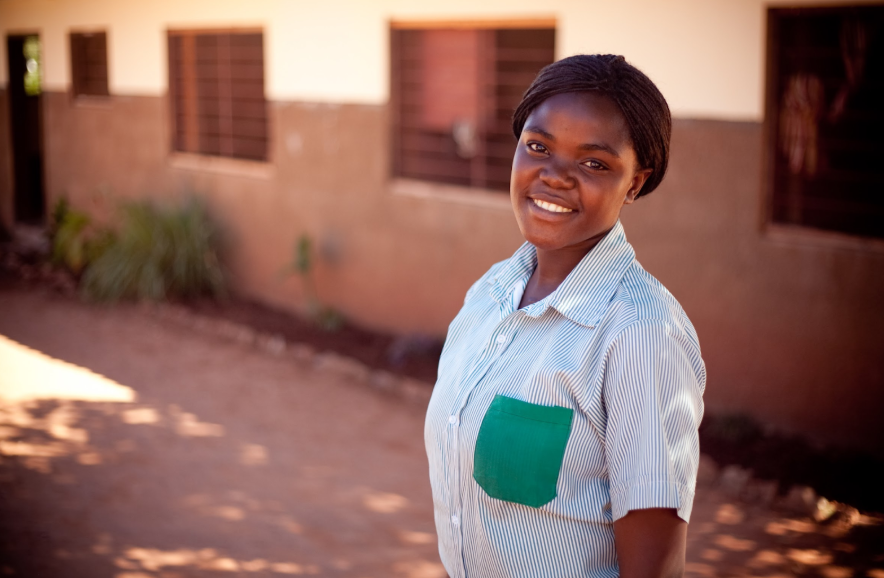
Image: Jean, at 14, at her new high school in Zambia.
“As a survivor, education helps you understand exactly what you are going through and helps you express yourself and seek help. It not only opens you up to the world of possibilities and how good your life can be in the future, but it also gives voice to what you went through.”
Jean Nangwala, Freely in Hope Alumni
I was challenged by how the dreams of survivors saw education as the key to freedom, healing, and flourishing not only for themselves, but for their communities too.
Education was what survivors desired most. If education was the key, then perhaps that is where I could begin. After meeting Lydia and Jean, their stories birthed a new dream in me, one of partnering with them to make those dreams a reality.
Image: Nikole learning from survivor-centered organizations in Kenya, 2010.
…
But soon after, I learned that simply providing a scholarship was insufficient.
Survivors needed safe housing, especially if they still lived in close proximity to their abusers, who were often step-fathers, uncles, and well-known spiritual leaders and business owners in the community.
Survivors needed access to trauma-informed therapy to heal the deep psychological wounds from abuse, and to undo the harms of rape culture, victim blaming, and oppressive perspectives.
Survivors needed a community of belonging—where they can gather in safe spaces and learn from other survivors on their unique journeys toward healing.
In learning from the feedback from Lydia and Jean, we expanded our scholarship to not just provide school fees, but to also provide holistic support—surrounding survivors with all they needed to thrive. By providing survivors with tuition fees, safe housing, health care, mentorship, legal aid, and a community of belonging, we empower survivors holistically so they have the tools to flourish in all aspects of their lives.
Image: Lydia and Nikole at the launch of Freely in Hope in Kenya, 2015.
When we care for the holistic needs of survivors, the results are incredible!
kenya
zambia
fih scholars
22%
6%
92%
Youth enrolled
in
higher education
5%
<1%
73%
2%
<1%
100%
SOURCE: World Inequality Database on Education on data from country-wide statistics of the demographic who the Freely in Hope serves and who live on less than $1.90 per day.
As Freely in Hope’s first scholars, Lydia and Jean shaped the evolution of our scholarship program that changed the trajectory of how we provided survivor-centered and survivor-driven care. Through our Holistic Education model, Freely in Hope scholars are thriving in their academic journey—achieving their dreams as lawyers, healthcare professionals, counselors, and community leaders across Kenya, Zambia, and beyond! Since 2010, we have supported 50 survivors of sexual abuse by providing holistic education.
“I’ve always loved school. It was taught to me as the only way out of poverty, and I was determined to create a better life, and the scholarship provided at that time was essential. However, I struggled with night terrors that kept me awake until the sun came up. This meant I never got enough sleep, which led to major depression. I also didn’t have many of the resources I needed to show up as my best self in school. When counseling, mental health support, safe housing, and upkeep were introduced to my journey in college, everything changed. I finally received the mental health help I needed to sleep through the night and process my pain. I could show up confidently in class, connect with my peers and lecturers, and no longer worry about food or basic needs.”
“Holistic care allowed me to learn, retain knowledge, and thrive academically. On graduation day, when I walked on stage to represent the entire student body by giving the class speech, I realized that it was holistic care that made the confident young woman standing in front of everyone possible.”
Jean Nangwala, Lead Storyteller & Freely in Hope Alumni
Image: Jean Nangwala graduating with a Bachelor’s Degree in Psychology.
In seeing the incredible growth, transformation, and success of our scholars, I have learned from their authentic voices that speak truth into dark places. It is these voices, arising from places of oppression, that provide a sense of hope for healing and liberation. It became clear to me that the oppressed would be the ones to lead us all into liberation. Thinking that I was working to heal their wounds, I found that their courageous lives were actually healing mine.
Image: Lydia Matioli, Nikole Lim, and Jean Nangwala celebrating at Freely in Hope’s anniversary gala in San Francisco, 2024.
Fifteen years ago, Freely in Hope began through one story in Kenya and one story in Zambia.
The vision that Lydia and Jean shared with me sparked a movement that has since grown from a personal dream to a global reality. Their stories have become the heart of our mission, shaping every program, every workshop, and every step we take toward building a safer world.
This year, Freely in Hope is celebrating fifteen years of survivor-driven impact. This exciting milestone is a testament to the power of collective action and the incredible impact of empowering those most affected to be the architects of their own future. Join us to continue uplifting survivor leadership over the next fifteen years, and beyond!
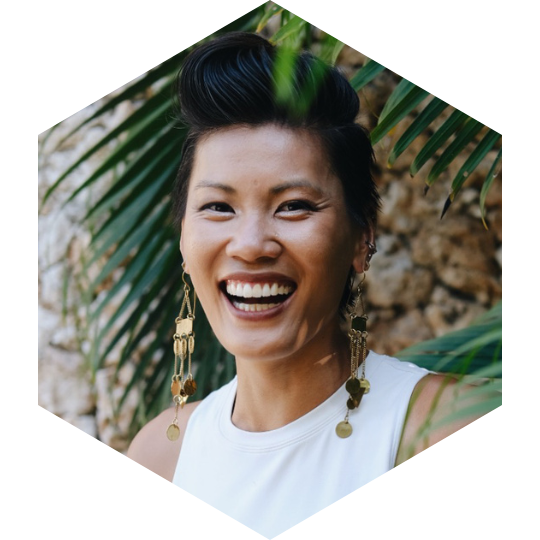
Nikole Lim
Founder & International Director
PS: Join us on a storytelling journey as we celebrate 15 years of impact through survivor leadership! Follow us on Instagram for more!
